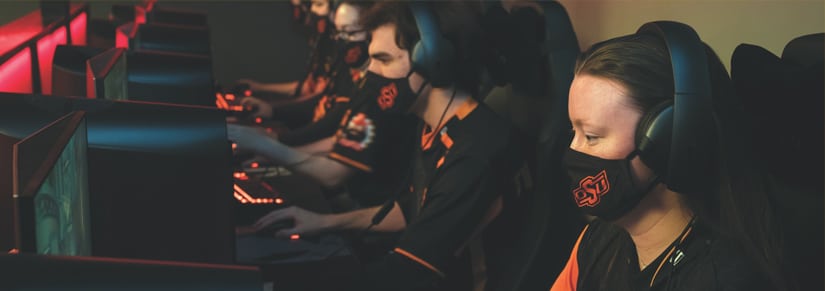Student Unions Quench Growing Thirst for Collegiate esports Arenas
Following the pandemic-related isolation students faced in 2020, it makes sense that 2021 is shaping up to be the year of collegiate esports. That has never been more evident than at ACUI, where five free online learning sessions on topics around esports have been offered since mid-September.
Whether established as creative COVID responses or the product of prior planning, campus esports programs have emerged in every flavor, from student clubs and competitive teams, to scholarship-offering campuses and academic programs offering a variety of majors and minors in esports and gaming. It’s not just about the players either, as students are coaching, managing social media and streaming, designing art and other marketing materials, and serving as shoutcasters who make livestreams a one-of-a-kind experience.

Florida Atlantic University unveiled its esports arena at the close of 2020, followed by Oklahoma State University in July 2021 and Southern New Hampshire University in October 2021. Other programs are in the works (though at least one, at Ohio University, is currently delayed by a global computer chip storage).
Students at Oklahoma State were quick to embrace their student union’s new 1,690 square-foot esports arena this year, which features 40 robust gaming PCs plus a Twitch station and green screen, said Tracie Brown, senior director, student union operations at Oklahoma State University.
“The students’ reception has been extremely positive and has exceeded our expectations,” Brown said. “The manager of the Oklahoma State University Esports Arena also acts as the advisor to the largest student group on campus: the Gamers of OSU. This allowed us to gain insight into what active users were passionate about, what they were seeing in arenas across the nation when they would travel to compete, and what they thought was ‘cool.’”
Brown said the student group’s insight helped form an inclusive mentality and generate a buzz across campus. “They saw this endeavor as an opportunity to showcase what they were capable of while also helping legitimize esports at Oklahoma State University,” she said.
The esports arena is also shattering gender stereotypes in the gaming space.
“We are seeing this not only within the Gamers of OSU but Oklahoma State University as a whole,” Brown said. “Currently, the group has five elected officer positions, three of which are held by females. We also have a great female presence within the arena throughout each week. We are starting to see students come in without knowing anyone else in the arena and teaming with each other. It has been a wonderful experience creating a space where students can come [from] across campus and engage with one another.”
Opportunities on the Digital Horizon
Meanwhile, established esports programs across the nation are enjoying increased adoption and success. In April of this year, two teams at the University of Southern Mississippi qualified for the National Esports Collegiate Conference’s post-season tournament — a significant accomplishment in the school’s first year of official competition. That same month, the University of Texas–Dallas Super Smash Bros. Ultimate team earned its second national title.
Because esports programs fit organizationally into student affairs, athletics, and academic divisions, they can provide a broad range of applications and benefits.
Some universities now officially recognize esports as a competitive sport, complete with potential scholarship opportunities. Others offer courses, minors, and degree programs. The School of Media and Strategic Communications at Oklahoma State is currently seeking approval on a two-year esports academic program after the OSU/A&M Board of Regents approved its certificate program in March.
In addition to digital entertainment, Student Union Director Michael Cooper said the esports arena and arcade at Florida Atlantic University also provides students with on-campus employment opportunities.
“We added a large number of new student positions with the addition of the esports arena, arcade, and the new box office areas along with new openings to help support our expanded new service requirements related [to] audio, video, and technical needs,” Cooper said.
Getting Started: Equipment and Other Considerations
Implementing a successful esports program means making strategic purchasing decisions. Having been through the process, Oklahoma State’s Brown suggests the following:
- Consider whether you’re seeking an aesthetic wow factor. “A lot of gaming PCs have RGB lighting, whereas high-end business-grade workstations won’t, even though they can be built with similar or identical hardware,” she said.
- Determine how many PCs you will need. “If the answer is greater than six, you should look into a diskless boot system,” Brown said.
- Remember: High network speed and low ping rates are critical for competitive gaming. “You will want to speak with your campus networking/telecommunications department about the capabilities of the space you are considering,” she said.
- Turn to other esports arenas for a basic hardware blueprint — and be prepared to maintain updates, security patches, and licenses. “There is more to a comprehensive esports solution from the IT perspective than simply choosing the best hardware for the job,” Brown said. “You also have to consider how you’re going to manage all of the hardware …[the task] has the potential to be an extremely labor-intensive endeavor for an IT team.”
Managed IT services providers can often offload such tasks for a reasonable fee. Looking for more information? ACUI will host four virtual esports education sessions in November and December, all of which are free to members.
The first, “University Esports Venues, Finding Your Path,” will be held on Tuesday, November 9, by ACUI corporate partner ggCircuit. ACUI members Danny O’Connell, University of Kansas esports coordinator, and Trevor Whiton, University of Washington senior activities advisor, will present “Coaching and Advising Esports Students” on November 16, then, on Thursday, November 18, guests can attend another learning event by a corporate partner, “A Guide to Collegiate Esports – Powered by Gamer Sensei, a CORSAIR Brand.
“Equity and Inclusion in Collegiate Esports” will be held December 14 with representatives from the*gameHERS, cxmmunity, and the California State University Esports Collective.
All of the esports events will be offered from 1:00 to 2:00 p.m. Eastern.

